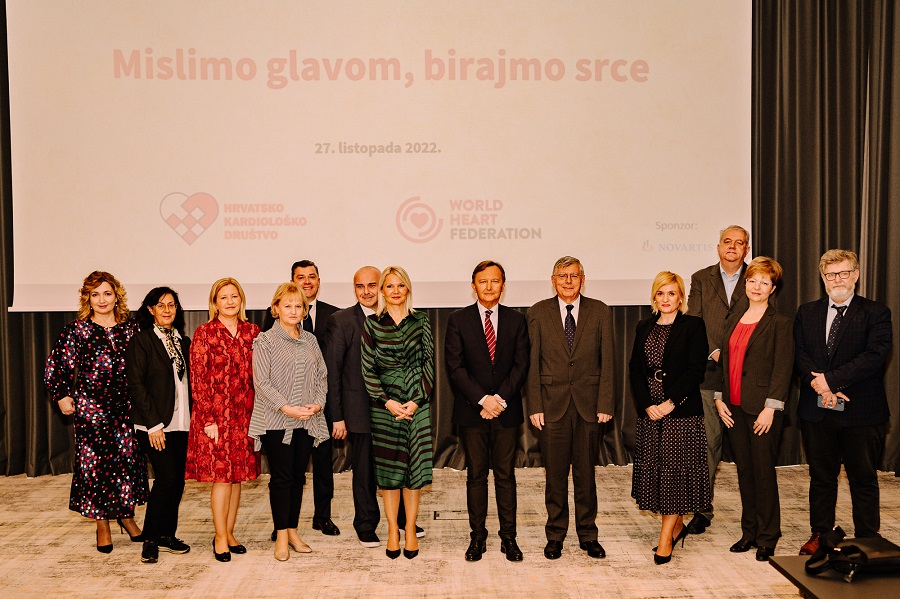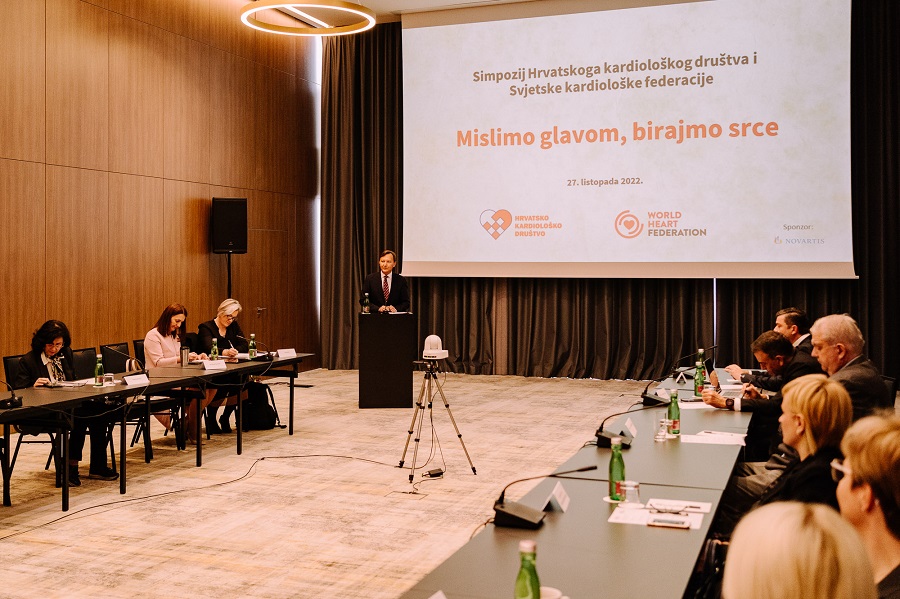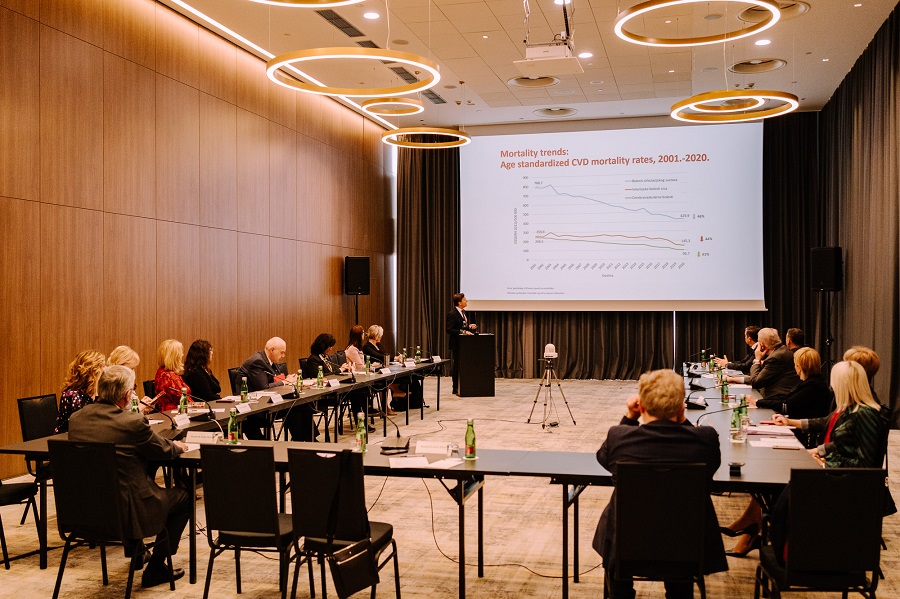Roadmap to Cholesterol: Croatia Among First to Implement New Global Project
October 29, 2022 - Croatia is very successful in the treatment of cardiovascular diseases but urgently needs to improve prevention - we are among the first to start implementing the new global Roadmap for Cholesterol, which was just presented in Zagreb, as well as other projects to improve the nation's cardiovascular health.
Although Croatians have the highest obesity rate amongst the citizens of the EU and insufficiently recognize and treat other key cardiovascular risk factors, Croatia went from the group of so-called very high-risk countries to the group of countries with a high risk of cardiovascular diseases. This is confirmation of the good practice of domestic experts in cardiovascular health, but the key next step is the National Plan for the Suppression of Cardiovascular Diseases with the aim of transforming into a group of countries with low cardiovascular risk – the most developed countries in Europe and the world.

The symposium named Use your brain chose your heart, organized by the World Heart Federation and the Croatian Cardiac Society in Zagreb and under the chairmanship of academician Davor Miličić, brought together the leading domestic experts in cardiovascular health. Just after the world premiere, got acquainted with the new Roadmap for Cholesterol 2022. It is a comprehensive document aimed at improving health outcomes and survival in patients with increased cardiovascular risk, with an emphasis on the importance of comprehensive prevention, early and high-quality diagnostics, and screening of risk groups from an early age. It was presented by the president of the European Society for Atherosclerosis and one of the world's leading authorities on cardiovascular diseases, prof. Kausik Ray. As the host of the symposium, academician Davor Miličić asserted that with more than 22,000 deaths from cardiovascular diseases per year, Croatia is among the countries with higher mortality rates than the EU average and is classified as one of the countries with a high cardiovascular risk in Europe. In Croatia, there is already a consensus on the need for the urgent adoption of the National Plan for the Suppression of Cardiovascular Diseases, which has the support of the Ministry of Health. Academician Miličić also pointed out that cardiology is a very successful field of Croatian medicine, within which a number of new diagnostic and therapeutic achievements have been introduced into routine practice, such as the primary network of interventional treatment in acute coronary syndrome and other most complex interventional procedures in diseases of the heart, aorta and peripheral vessels. Great progress was also made in arithmology and electrostimulation, and of course, in heart transplantation and the use of mechanical circulation pumps, which is why Croatian cardiology is internationally recognized and acknowledged. Therefore, our cardiology patients, even the most difficult ones, can receive high-quality and comprehensive cardiology care in Croatia.

"In order to bring Croatia closer to countries with the lower mortality rates from cardiovascular diseases, it is necessary to simultaneously work on six key challenges – comprehensive primary prevention targeted active and systematic detection of high-risk patients who do not yet have an established diagnosis, such as those with familial hyperlipoproteinemia, reduction of obesity and cardiometabolic risk, public health campaigns, the introduction of new therapies in accordance with the guidelines of the European Society of Cardiology and, of course, the consistent and steady implementation of a comprehensive National Plan for the suppression of cardiovascular diseases" concluded academician Miličić.
Academician Miličić also pointed out screening for familial hyperlipoproteinemia among preschool children as one of the future major public health projects, whereby Croatia would be one of the first countries with this type of screening that exposes children with an extremely high cardiovascular risk, but also their parents and siblings. This enables the start of effective treatment and prevents cardiovascular disease and mortality, which without treatment can be expected in adolescence or young adulthood. Academician Željko Reiner reminded it is a congenital disease where patients have a lifelong high value of LDL cholesterol, which needs to be effectively and permanently controlled.

"It is estimated that about 20,000 people in Croatia suffer from such a hereditary form of high cholesterol, of which only one percent has been recognized. Due to long-term imperceptible exposure to high values of bad LDL-cholesterol, these people have a 20 times higher risk of developing cardiovascular diseases than the rest of the population. In this procedure, after identifying a child with familial hypercholesterolemia, the cooperation of a family medicine doctor, but also of the whole family, which would be covered by screening and the possibility of effective, timely treatment, is needed," added academician Reiner, president of the Croatian Society for Atherosclerosis.
The Ministry of Health strongly supports the proposals and conclusions of the Symposium, pointed out the representative of the Ministry, Dr. Ivana Portolan Pajić. "The upcoming healthcare reform is making a big turn towards primary prevention, early disease detection, and the implementation of screening for familial hypercholesterolemia in preschool children, which will begin in 2023," she concluded.

Academician Bojan Jelaković, president of the Croatian Society for Hypertension, reminded me of the importance of reduced salt intake. "In the last 12 years, we have recorded a significant decrease in salt intake, both among citizens and through cooperation with the food industry, as well as a decrease in blood pressure values. But we still have to work systematically to highlight the danger that excessive salt consumption poses to human health," added academician Jelaković. With this Symposium, Croatia hosted the World Heart Federation for the first time, which is the representative of the global cardiovascular community, and gathers more than 200 member organizations in more than hundreds of countries.
Comment on Doctors' Wages Prompts Croatian Medical Chamber to Hit Back at Prime Minister and Health Minister
ZAGREB, 23 July 2022 - The Croatian Medical Chamber (HLK) on Friday said that Prime Minister Andrej Plenković's comment on doctors being among the better-paid public employees was inappropriate and it countered with the explanation that those higher salaries were the result of their working additional hours.
Asked about reports that a thousand doctors in Croatia had handed in their resignations, Prime Minister Plenković said earlier on Friday that he did not know about it, adding that doctors were among the better-paid public employees in Croatia.
"The only ones that perhaps have a higher salary are air traffic controllers, who are complaining about HRK 50,000. A stressful job. Come on," he said. The Prime Minister underscored that the government had increased salaries in health care in general, and that he didn't know when someone would be satisfied.
I think everyone needs to realise what kind of global crisis we are in, and understand that this is a time when we have to return to our joint contribution to solidarity, Plenković said.
However, the Croatian Medical Chamber accuses Plenković of having intentionally kept silent about the fact that the examples of high salaries of some doctors, revealed in media, were actually the result of of their overtime work with even 150 or 200 extra hours a month.
The Croatian Medical Chamber explains that so many hours worked in excess by doctors in hospitals were the result of shortage of specialist doctors and some of those employed professionals employed work double time to keep the hospital system functioning and make it available to patients.
The press release signed by the medical chamber's president, Krešimir Luetić blames Prime Minister Plenković and Health Minister Vili Beroš of poor management of the hospital system, "irrational public procurement in the healthcare system" and long waiting lists.
Croatia Reports 1,148 New COVID Cases, Five Deaths
ZAGREB, 30 June 2022 - In the last 24 hours 1,148 coronavirus cases, out of 3,532 tests, and five related deaths have been registered in Croatia.
There are 5,261 active cases, including 245 hospitalised patients, five of whom are on ventilators, while 2,682 persons are self-isolating.
To date, Croatia has registered 1,148,528 coronavirus cases, the death toll is 16,065 and 70.82% of the adult population has been vaccinated.
For all you need to know about coronavirus specific to Croatia, make sure to bookmark our dedicated sectionand select your preferred language if it isn't English.
Banning Abortion Would Be Against Constitutional Court Decision, PM Says
ZAGREB, 30 June 2022 - Prime Minister Andrej Plenković said on Thursday the US Supreme Court ruling, which leaves the legality of abortion to the federal states and has led to big divisions, would not impact Croatia as banning pregnancy termination would be contrary to a Constitutional Court ruling.
Speaking at a cabinet session, he said pregnancy termination was an extremely complex legal, ethical and medical issue on which it was often impossible to reach a consensus, but that it was necessary to consider the matter.
"This ruling won't impact Croatia. In Croatia, the right to pregnancy termination is regulated by law and the Constitutional Court has found that the law is in line with the Constitution."
As the Court's president Miroslav Šeparović said recently, banning pregnancy termination would be contrary to the Court's ruling, as would a referendum to restrict or ban pregnancy termination rights, Plenković said.
"In the political sense, there's no need to misinform people with the goal of scoring political points and there's no need to include in the Constitution regulations on an already existing right. We won't agree to such changes."
He called on the opposition to be constructive about this issue and to support changes to the constitutional law on the Constitutional Court, which he said were aimed at additionally protecting constitutional rights, those that cannot be decided in referenda.
Plenković said the ruling HDZ was a Christian Democrat centre-right party advocating the protection of life from conception, while also respecting a woman' right to choose and health.
"Our wish is that there are as few pregnancy terminations in our society as possible, that they are the exception, but statistics and other countries' experience show that this is not achieved by bans. Bans don't lead to fewer abortions, but can make them unsafe and dangerous for a woman's life and health."
Politics: For more, check out our politics section.
EMS Workers' Unions to Prepare Their Proposal for Emergency Medical Aid Law
ZAGREB, 19 April 2022 - Trade unions of emergency medical services workers on Tuesday held a working meting with Health Minister Vili Beroš on their demand to adopt a single law on emergency medical aid which will stipulate an accelerated retirement plan for paramedics.
The unionists expressed satisfaction with the meeting and said that they would present their proposal for an emergency medical aid bill in two weeks' time.
Unionist Danijel Šota said that a new meeting would be convened in two weeks' time to discuss the proposed drafts for this legislation that will regulate a reduced working life for EMS workers, the expansion of teams of emergency medical services, and paramedic helicopter services.
Five days ago, a few hundred protesters requested a meeting in the government on the reintroduction of an accelerated retirement plan, which was abolished during Andrija Hebrang's ministerial term of office.
They insist on a single law, following the example of relevant legislation for the police and firefighting services.
Ombudsman Comments on Outrageous Incidents Targeting the Disabled in 2021
ZAGREB, 16 April 2022 - Ombudsman for Persons with Disabilities Anka Slonjšak has warned that in 2021 there was a rising number of incidents in which children with disabilities were exposed to discriminatory speech and that some of those cases that outraged the public, criminal proceedings were launched.
"We have warned about the cases of hate and prejudicial speech," Slonjšak said in her annual report.
In one of those cases, a child with autistic spectrum disorder was told to leave a patisserie in the town of Samobor with the explanation that "such children belong to the woods". In another case, a mother and her daughter with Down Syndrome had to leave a cafe in Zadar as they "are damaging the reputation of the cafe."
Some incidents of this kind have been the reason to press charges against bullies whose behaviour outraged the public.
The Office of Ombudsman for Persons with Disabilities monitors and promotes the rights of over 612,000 persons with disabilities, including 30,000 students with developmental disorders.
In 2021, a number of complaints lodged with the Office increased by a fifth compared to 2020.
Most complaints referred to the conduct of social welfare (502), while 329 referred to difficulties in employment and on the labour market, and 280 concerned access and mobility.
COVID takes lives of 2,500 disabled persons
During the COVID pandemic almost 110,000 of them caught coronavirus, according to the statistics kept until 9 March 2022, and approximately 2,500 died from the infection, while in Croatia so far about this infection has taken over 16,000 lives.
The pandemic has led to the degradation of the rights of disabled citizens, the Ombudsman warns.
Association Requests Preparation of New Law on Patients' Rights
ZAGREB, 16 April 2022 - The Croatian Association for Patients' Rights said on Friday that due to the fact that more and more complaints are being filed by patients, a new law on patients' rights should be prepared, "because the current one from 2004 is not applicable."
On the occasion of the European Day of Patients' Rights, observed on 18 April, the association issued a statement warning about "an increase in patient complaints and inadequate responses from official institutions" which have led to "an increased number of lawsuits even outside Croatia."
The association also requests the preparation of a new law on the protection of patients' rights.
The new legislation should propose "mandatory education of health professionals in hospitals on how to respond to complaints and the institution's obligation to appoint a mediator who will resolve disputes between health professionals and patients." It also asks the introduction of sanctions for the violation of patients' rights.
The association demands that it should be "granted public authority so that in addition to internal investigations, an official investigation of patients' complaints can be conducted" by the association "as the only independent institution in the Republic of Croatia, which is also protected by copyright."
The association recalls that earlier this month an initiative called " Patient Ombudsman" was launched to educate healthcare workers about patients' rights and that so far six Croatian hospitals have been granted the status of European Patient Partnership: KBC Split, KBC Rijeka, KB Sveti Duh, OB Dubrovnik, OB Pula and the hospital for lung diseases in Zagreb's Rockefellerova Street.
For more, check out our lifestyle section.
World Health Day in Croatia: Our Planet, Our Health
April 7, 2022 – World Health Day is marked under the slogan "Our planet, our health". This year, the data from a large European study reveals the prevalence and incidence of the most common diseases.
HRT reports on the situation in Croatia, where as many as one million and two hundred thousand people have hypertension, while ten percent of the population has diabetes and chronic obstructive pulmonary disease. These are data from the first such research in Croatia as part of a European project on the incidence of the most common diseases. This year's World Health Day aims to raise awareness of the impact of the environment on human health.
The most common diseases in Croatia are hypertension, chronic lung diseases, and diabetes
Hypertension, chronic lung diseases, and diabetes are the most common diseases of the elderly population in Croatia, according to data on population morbidity presented by the Croatian Institute of Public Health (HZJZ) for the first time today on World Health Day.
These are data for Croatia collected as part of the Eurostat project "Morbidity Statistics", with the aim of determining the incidence of certain conditions and diseases as determined by the European Commission.
The collected data shows that almost a third of the Croatian population suffers from hypertension, and this share increases significantly in the elderly population - eight out of ten people over the age of 65 have some of the diseases in this group.
Chronic lung diseases also affect the elderly population, with data showing that one in ten people over the age of 65 suffer from such diseases.
The research once again proved a high presence of diabetes among the population: almost 10 percent of the Croatian population suffers from diabetes, with a rise to a quarter of the population over 65.
High prevalence of mood disorders, anxiety, arthrosis, dementia ...
Mood disorders (affective disorders), which were diagnosed in 6.6 percent of the population, also have a high prevalence. They are twice as common in women as in the male population (8.7 percent versus 4.4 percent) and are most often diagnosed in women over 50.
The situation is similar when it comes to anxiety disorders. They are twice as common in women as in men (16.7 percent versus 8.3 percent), and especially affect the female population after the age of 50.
Osteoarthritis has a relatively high prevalence - 10.8 percent of the population, ischemic heart disease - 5.8 percent and cerebrovascular disease - 2.9 percent.
The prevalence of dementia (including Alzheimer's disease) in the age group over 60 is 2.9 percent, with it being twice as common in women after the age of 70.
The reference period was from 2015 to 2017, data were collected from 1 March 2019 to 1 September 2020. In addition to Croatia, a number of countries took part in the project, including Belgium, Germany, Finland, France, Hungary, Lithuania, Malta, the Netherlands, and Poland.
The publication is the beginning of systematic data collection on the frequency of leading public health problems in Croatia based on prevalence (total number of cases) and incidence (number of new cases), not just on the use of health care, which is a big qualitative step in national health statistics.
“The World Health Organization estimates that more than thirteen million deaths worldwide, including 1.4 million deaths in the European Region of the World Health Organization are related to avoidable environmental factors”, said Primarius Iva Pejnović Franelić, MD, Ph.D. of the Croatian office of the World Health Organization.
For more, make sure to check out our lifestyle section.
This Year's World Water Day Dedicated to Groundwater
ZAGREB, 22 March 2022 - This year, World Water Day, which is observed on 22 March, is dedicated groundwater, which Croatia treats as its special asset.
Over 90% of water used for water supply systems in Croatia comes from groundwater, according to a press release issued by the Economy and Sustainable Development Ministry on Tuesday when World Water Day was celebrated under the slogan "Making the Invisible Visible".
Croatia's renewable underground resources are estimated at some 22.43 billion cubic metres per year. Also, the quality of groundwater in the country is high.
The ministry also notes that under the 2014-2020 Competitiveness and Cohesion Programme, a greenlight has been given to a total of 60 projects concerning the improvement of wastewater and water management system in Croatia.
Their total value is HRK 25.8 billion, and admissible costs are put at HRK 20.5 billion, of which HRK 14.4 billion is covered by grants from the EU funds.
The completion of those 60 projects will enable 575,000 Croatians to get access to safe drinking water from the public water supply system, and approximately 2.5 million inhabitants will be provided with the improved wastewater and water purification systems.
As many as 1,700 kilometres of water supply networks and also 4,100 kilometres of public drainage systems will be constructed or upgraded.
Croatia has 25 billion cubic metres of surface water supply. Of that 23 percent refers to sources, streams and rivers springing and pouring into on Croatian territory.
All natural and artificial streams in Croatia are some 32,000 kilometres long on the aggregate.
(€1 = HRK 7.564472)
Colorectal Cancer First in Terms of New Cases Diagnosed Annually
ZAGREB, 12 March 2022 - Colorectal cancer is first in Croatia in terms of cases diagnosed every year and only 20% to 30% of citizens respond to calls for screenings, it was said on Saturday at an event marking Colorectal Cancer Awareness Month.
"We have about 3,600 new cases annually and about 10% of people daily get this disease," said Krunoslav Capak, director of the Croatian Institute of Public Health (HZJZ).
This is the most frequent cancer in Croatia at the moment and we should all fight against it together through prevention and a healthier lifestyle, he added.
This year Colorectal Cancer Awareness Month is being marked for the first time under a decision of the Croatian parliament in order to highlight the importance of screenings.
In 2007, Croatia introduced a programme for colorectal cancer screening for adults aged between 50 and 74, and according to relevant statistics, residents in coastal areas seem least ready to undergo this test.
In Croatia, six people die of this disease daily on average and between 2,000 and 2,100 annually.
The HZJZ said recently that in the coastal counties, except Zadar County, the turnout for the colorectal cancer screening is under the Croatian average.
Regular screening reduces the risk of developing colorectal cancer.
The mortality rate can be reduced provided that those aged between 50 and 74 undergo regular tests and follow doctors' orders.
The HZJZ said that this would be conducive to efforts to save 1,000-1,500 patients annually.


